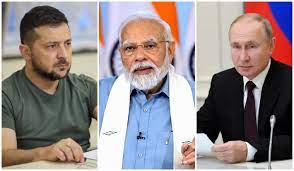India Adopts Calculated and Strategic Stance Amid Russia-Ukraine Conflict
By Lokmat English Desk | Updated: September 12, 2024 13:38 IST2024-09-12T13:37:25+5:302024-09-12T13:38:12+5:30
As the world grapples with the far-reaching effects of the Russia-Ukraine conflict, global economies are feeling the strain. Under ...

India Adopts Calculated and Strategic Stance Amid Russia-Ukraine Conflict
As the world grapples with the far-reaching effects of the Russia-Ukraine conflict, global economies are feeling the strain. Under the leadership of Prime Minister Narendra Modi, India has demonstrated remarkable fiscal prudence during these challenging times, managing prices and ensuring stability for its citizens. India has navigated the volatile global markets for essential resources while maintaining domestic economic balance.
Impact of the Conflict
India's dependence on imports for oil and urea makes it particularly vulnerable to global disruptions. Russia and Ukraine, both major suppliers of these commodities, have been embroiled in conflict for more than two years, causing significant disruptions in global supply chains and price volatility. Despite these challenges, India's diplomatic efforts have been crucial in ensuring a stable flow of both oil and urea.
Surge in Oil Imports
Recent data reveals a dramatic shift in India's oil import sources. Russia has emerged as India's largest oil supplier, now accounting for over 20% of the country's total oil imports, a significant increase from just 2% before the conflict. This surge highlights India's successful diplomatic maneuvering in maintaining stable oil supplies despite global upheaval. Import statistics from recent months underscore this trend, showing a sharp rise in oil imports from Russia.
Maintaining Fertilizer Supplies
Similarly, India's strategic dialogues have ensured the continued import of fertilizers, essential for the country's agricultural sector. The Modi government's focus on strengthening ties with both Russia and Ukraine has helped preserve these critical supply chains. Diplomatic efforts have ensured that urea imports have not faced severe disruptions, despite the ongoing conflict's impact on global supply chains.
Economic Measures and Subsidies
In response to rising global prices, the Modi government has implemented several measures to shield consumers and farmers from economic fallout. One key strategy has been expanding subsidy programs. Oil subsidies have played a vital role in stabilizing fuel prices at the pump, while urea subsidies have helped prevent a significant rise in fertilizer costs for farmers. Notably, urea subsidies have doubled over the past year, reflecting the government's commitment to supporting the agricultural sector during these challenging times.
Trade-offs and Challenges
However, maintaining these subsidies presents its own challenges. The substantial funds allocated to sustain these subsidies have been diverted from other critical sectors, such as job creation, infrastructure development, and social welfare. This trade-off highlights the tough decisions the government has had to make, prioritizing short-term relief over long-term investments. The financial strain of these subsidies is evident in the broader economic landscape, affecting other essential areas of growth.
Looking Ahead: Reducing Dependency
India's approach to securing the necessary supplies of oil and urea through diplomatic channels has been crucial in avoiding severe disruptions. By maintaining strong ties with both Russia and Ukraine, India has managed to stabilize its supply chains during a period of global uncertainty. While these short-term measures have been effective, the Modi government is also working towards long-term solutions. The focus is gradually shifting towards increasing self-reliance in critical sectors such as oil and urea. This strategic shift aims to reduce dependency on global suppliers and mitigate future risks associated with international conflicts.
Open in app